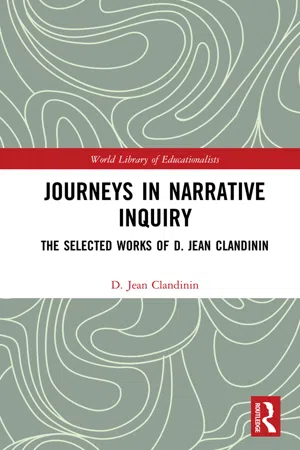Since that time there has been an explosion of interest in narrative inquiry. Narrative inquiry is a ubiquitous practice in that
human beings have lived out and told stories about that living for as long as we could talk. And then we have talked about the stories we tell for almost as long. These lived and told stories and the talk about the stories are one of the ways that we fill our world with meaning and enlist one another’s assistance in building lives and communities. What feels new is the emergence of narrative methodologies in the field of social science research.
(Clandinin & Rosiek, 2007, p. 35)
Since the late 1980s and early 1990s, research in the social sciences has taken a narrative turn to studying experience (Pinnegar & Daynes, 2007). While there is a history of narrative work within the traditions of narratology (the theory and study of narrative) and narrative research, it was in 1990 that we described this research methodology we were developing as narrative inquiry. While initially we wrote of narrative inquiry as both phenomenon and method, we quickly began to understand it was a research methodology. What was apparent was how interwoven narrative ways of thinking about phenomena are with narrative inquiry as research methodology. It was “the interweaving of narrative views of phenomena and narrative inquiry that marks the emerging field and that draws attention to the need for careful uses and distinctions of terms” (Clandinin & Rosiek, 2007, p. 36).
What we saw as a need for careful attention to terms has led to debates within the emerging methodology. Reissman and Speedy (2007) pointed out that “narrative inquiry in the human sciences is a 20th century development; the field has ‘realist’, ‘postmodern’, and constructionist strands, and scholars and practitioners disagree on origin and precise definition” (p. 429). This diversity in the various ways that narrative inquiry is taken up both enriches, and troubles, those of us engaged in narrative inquiry. Without a clear sense of the epistemological and ontological commitments of those who work within the field, much is blurred.
Narrative has, for example, come to refer to almost anything that uses, for example, stories as data, narrative or story as representational form, narrative as content analysis, narrative as structure, and so forth. I had, for example, a well-known editor point out to me that s/he had found many references that I had omitted from a review manuscript on narrative inquiry. When I questioned him/her about what s/he had found, and that I had missed, it turned out that s/he had used the search term “narrative” alone and the search engine reported links to many articles with often tangential links to what we are calling narrative inquiry. What is apparent is that some forms of what is called narrative analysis such as thematic analysis, linguistic analysis, structural analysis, and, more recently, visual analysis, are used as methods within other qualitative research methodologies. While they are all grouped under a label of narrative analysis, what narrative refers to as a descriptor varies widely. Within the field of qualitative research, there are many analytic methods or forms of narrative analysis (Josselson & Lieblich, 1995; Josselson, Lieblich, & McAdams, 2003; Polkinghorne, 1988; Reissman, 2008). Stories or narratives are also used as data in other qualitative methodologies such as phenomenology and case study. Narratives or stories are used as representational forms for results or findings in various qualitative and quantitative methodologies. More recently narratives or stories are used in knowledge translation in health science, education, and other professional disciplines. Questions about just what each of us means by our use of the term narrative is becoming increasingly important.
Narrative inquiry, as its own methodology, has developed important terms and distinctions that have become more apparent and well-recognized as guiding what counts, or what fits, within the field of narrative inquiry or narrative research. There is now a well-established view of narrative inquiry as both methodology and phenomena (Clandinin, 2007).
Dewey’s theory of experience (1938) is most often cited as the philosophical underpinning of narrative inquiry (Clandinin & Connelly, 2000). Dewey’s two criteria of experience – interaction and continuity enacted in situations – provide the grounding for attending to a narrative conception of experience through the three-dimensional narrative inquiry space with dimensions of temporality, place, and sociality. Paradigmatic and narrative knowing (Bruner, 1986), narrative structure and coherence of lives (Carr, 1986), concepts of continuity and improvisation as a response to the uncertainties in life and life contexts (Bateson, 1989; 1994), and narrative in life and teaching practice (Coles, 1989) also ground our understandings of experience as narratively composed. Drawing on all of these works, Clandinin and Rosiek (2007) point out,
Framed within this view of experience, the focus of narrative inquiry is not only on individuals’ experience but also on the social, cultural, and institutional narratives within which individuals’ experiences are constituted, shaped, expressed, and enacted. Narrative inquirers study the individual’s experience in the world, an experience that is storied both in the living and telling and that can be studied by listening, observing, living alongside another, and writing, and interpreting texts.
(pp. 42–43)
Rosiek and I make clear that narrative inquiry, working from a particular ontological and epistemological stance, is a way of understanding and inquiring into experience. It is nothing more and nothing less. Narrative inquiry is situated in relationships and in community, and attends to notions of expertise and knowing in relational and participatory ways.
